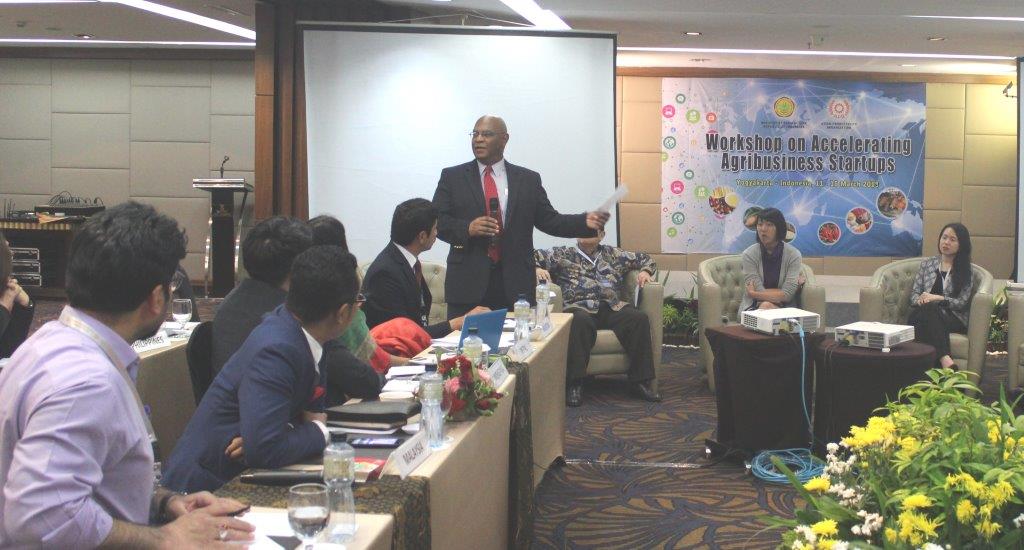
Select Page
The Asian Productivity Organization (APO) concluded a workshop on Accelerating Agribusiness Startups in Yogyakarta, 11–15 March 2019. The collaborative program with Cornell University’s Dyson School of Applied Economics and Management was conducted with support from Indonesia’s Bureau for International Cooperation of the Ministry of Agriculture and Directorate General of Training and Productivity of the Ministry of Manpower.
 The five-day course aimed at improving participants’ knowledge and skills in promoting SME development, especially agribusiness startups. It covered best practices in planning and managing startup agribusinesses from the incubation to postincubation periods, focusing on improving food security in the Asian region, sustainable agribusiness systems, and increasing value added and competitiveness in the sector.
The five-day course aimed at improving participants’ knowledge and skills in promoting SME development, especially agribusiness startups. It covered best practices in planning and managing startup agribusinesses from the incubation to postincubation periods, focusing on improving food security in the Asian region, sustainable agribusiness systems, and increasing value added and competitiveness in the sector.
Food and agribusiness have huge economic, social, and environmental impacts. The global food and agribusiness industry is estimated to be worth USD5 trillion and represents 10% of global consumer spending, 40% of employment, and 30% of greenhouse gas emissions. Opportunities in agribusiness have expanded substantially due to the globalization of trade, the Asia-Pacific region’s rising incomes, and increasing population. These developments are opening up various opportunities as well as challenges, such as how to feed a global population predicted to increase by 70% by 2050, with doubled crop consumption.
Efforts to expand agribusiness operations must deal with agriclimatic changes along with progressive decimation of arable land and declining water availability due to the expansion of industrial and residential areas. The situation is worsened by urbanization, since the relocation of young workers to cities has created a new era in which the main farm laborers are the elderly and women.
In welcoming participants, Director of Productivity Muhammad Zuhri Bahri of the Ministry of Manpower and Head of the NPO of Indonesia mentioned that agriculture employed more workers than other sectors, and agricultural startups had the potential to offer opportunities to many more. In addition to maintaining fair pricing for agricultural products, innovation was a critical factor for agrifood enterprises to achieve higher productivity and competitiveness.
Digitization had become more important with the significant decrease in the number of farmers over the past decade, continued NPO Head Bahri. Many initiatives had been undertaken to address the problems in the agriculture sector, such as establishing national programs involving not only central governments but also provincial units, state-owned enterprises, the private sector, and communities to utilize digital technologies to increase farmers’ incomes and welfare.
During the opening session, Secretary General Syukur Iwantoro of the Indonesian Ministry of Agriculture remarked that there were hundreds of agribusiness startups around the world providing business opportunities for young, innovative entrepreneurs at various stages of agricultural commodity value chains. With increased smartphone penetration in remote areas, farmers could now easily access information on the supplies of inputs as well as markets for their agricultural produce.
Secretary General Iwantoro explained four initiatives Indonesia had developed to optimize the use of technology in the food and agriculture sector: precision farming to increase productivity through the introduction of machinery; digital hubs to connect agricultural supply chains; microfinancing for farmers using digital applications; and online agricultural commodity auctions. Their combined benefits were expected to improve the prosperity of Indonesia’s farm households.
In his presentation, Professor Ralph D. Christy, Director of the Emerging Markets Program, Cornell University, pointed out how innovative marketing strategies inform effective marketing plans that enhance the performance of food industry agribusiness startups and accelerate their contributions to sustaining economic growth.
The workshop was attended by 29 participants from 15 APO member countries, along with six local observers.